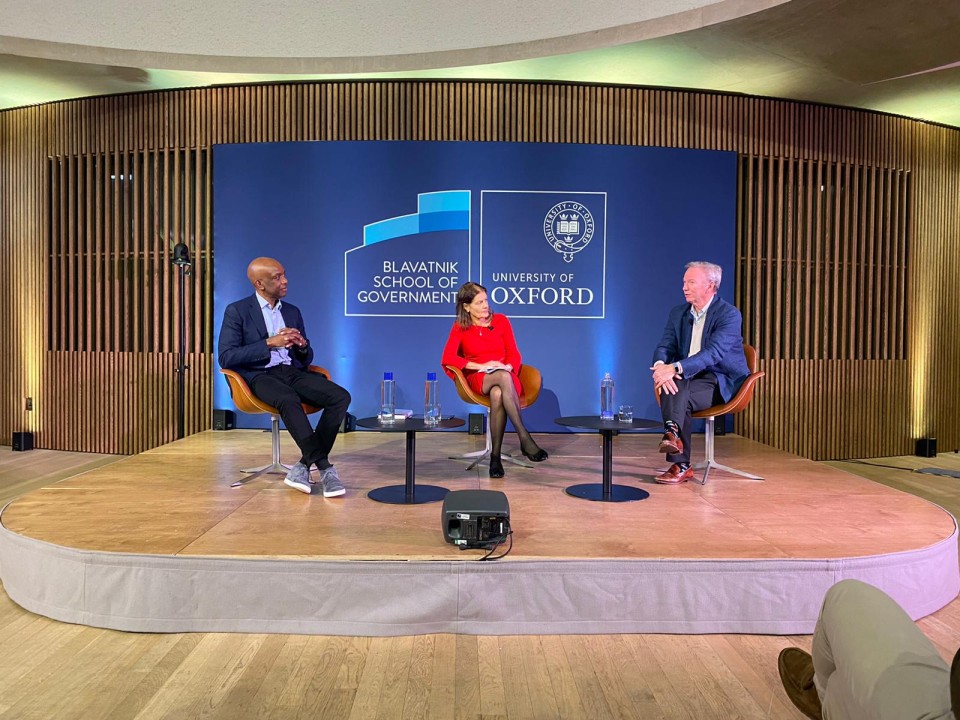AI and the MPP: A conversation with Eric Schmidt and James Manyika
How can lessons from the MPP be applied to questions relating to AI and global security?

Following a talk by AI experts Eric Schmidt and James Manyika at the School, David Morrow reflects on the potential policy challenges the widespread use of AI may provoke
We are about to enter Week 4 on the Master of Public Policy (MPP) at the Blavatnik School of Government. In reality, it is Week 6 if you include our two-week induction. As well as learning over 140 names, we have gotten through a massive amount of content on the course already.
The extent of what we have covered came home to me on Friday evening, when former Google CEO Eric Schmidt and Director of the McKinsey Global Institute James Manyika casually popped into the school for a chat about Artificial Intelligence (AI) (I’m still getting my head around the fact that this sort of thing actually happens here).
In the context of his new book on AI, Eric set out the importance of leaders from across multiple fields in Western countries working together to define what we as a society want to achieve with AI. In practice, there should be a public discussion regarding what we value about the society we live in, what we want to achieve from a public policy perspective, and how AI can be used to help us get there.
In our Foundations module this term we have focused on the principles regarding what governments should and should not do, and what they should aim for in terms of public policy. The theory of Utilitarianism, as set out over 200 years ago, argues that governments should aim to maximise happiness. We have been discussing the merits and shortcomings of theories like this, and how they guide when and how governments should or should not intervene. Two centuries on, in the context of AI, the discussion regarding what kind of society we want to live in and how government policy should facilitate this is as alive and relevant as ever.
James then expanded on how in the future, each person will have enhanced personal AI assistants. Increasingly, the AI assistant will do jobs that it can do better as a computer, freeing humans up to focus on what we do best as humans.
In our economics module, we have been studying the theory of comparative advantage: that countries benefit from trade when they focus on the things that they do most efficiently. To extend the theory only slightly, if AI and humans split tasks according to their respective strengths, this could lead to huge gains in productivity for society, as it has done in international trade. But while comparative advantage can work for countries as a whole, it doesn’t necessarily work for everyone within countries. Similarly, there’s no doubt that the new division of labour proposed with AI will not be without political contention.
Responding to a question from a classmate, Eric closed by arguing that regulation departments across the globe, but particularly in Europe, should be rebranded “Regulation and Growth” departments, emphasising their facilitative role in enabling technological and economic progress.
In our Policy Challenge module, which focuses on real-life decisions taken by policymakers, we have discussed the concept of “Thin Political Markets. This is when important policy decisions are made by relatively few actors who have skin in the game. This happens because the decisions are technical in nature, of little immediate interest to the media or the public, and expertise is concentrated in market participants by nature of their resources and practical knowledge gained from working in the system.
While not a perfect parallel, my challenge to Eric’s suggestion is how can regulators facilitate economic growth at the same time as effectively challenging the technology companies, and clamping down on market failures and erroneous incentives in a way that they failed to do with the banks prior to the financial crisis? And further, can tech companies win the trust of the public that their contributions to public policy and regulation will be in the interests of society at large rather than narrow commercial ones? No simple answers, but relevant questions in the context of recent news.
The whole conversation was excellent, brilliantly facilitated by our Dean, Ngaire Woods, and all of it directly relevant to the MPP. That is how it should be: the MPP is a practical course with real-world application for people who are, or want to be, actively involved in policymaking. Events organised by the school give us the chance to interact with people who have been there and done that (and are usually still doing it) and to consider what we are learning in the context of real-world problems.
And so we move into Week 4. This week is no less crammed full of things to do, learn and enjoy. While the extra hour at the weekend was welcome, I guess we’ll just have to work within the usual 24-hour framework we have. Another extra hour would be nice, but if the price is even less sunlight, then it’s a no from me. Roll on Week 4.

